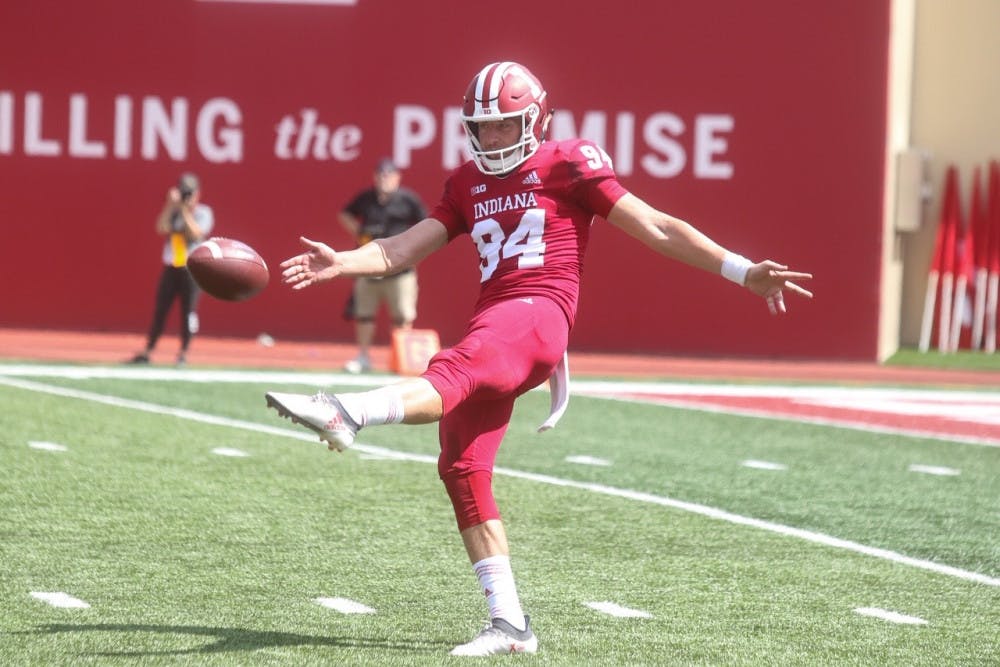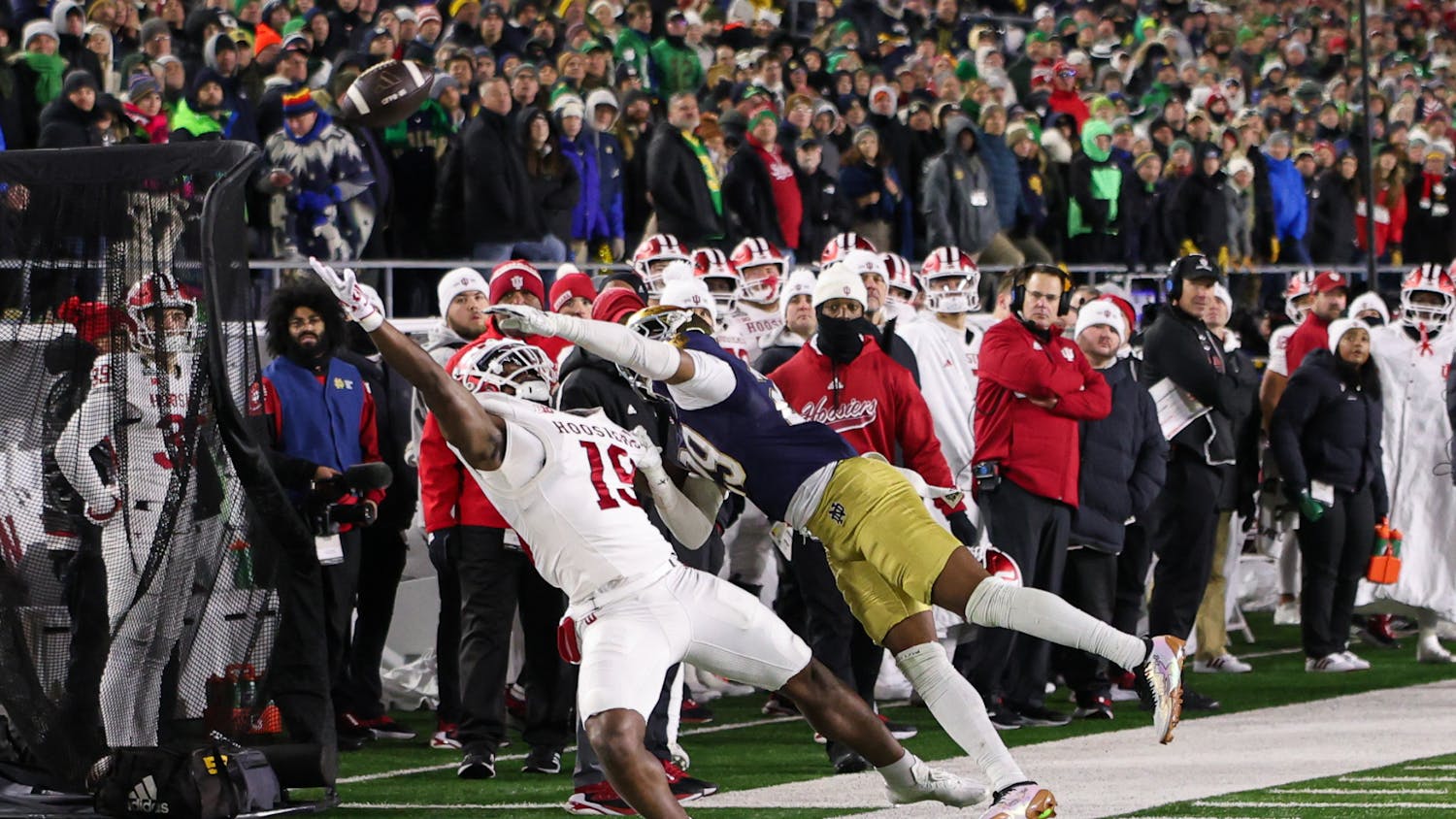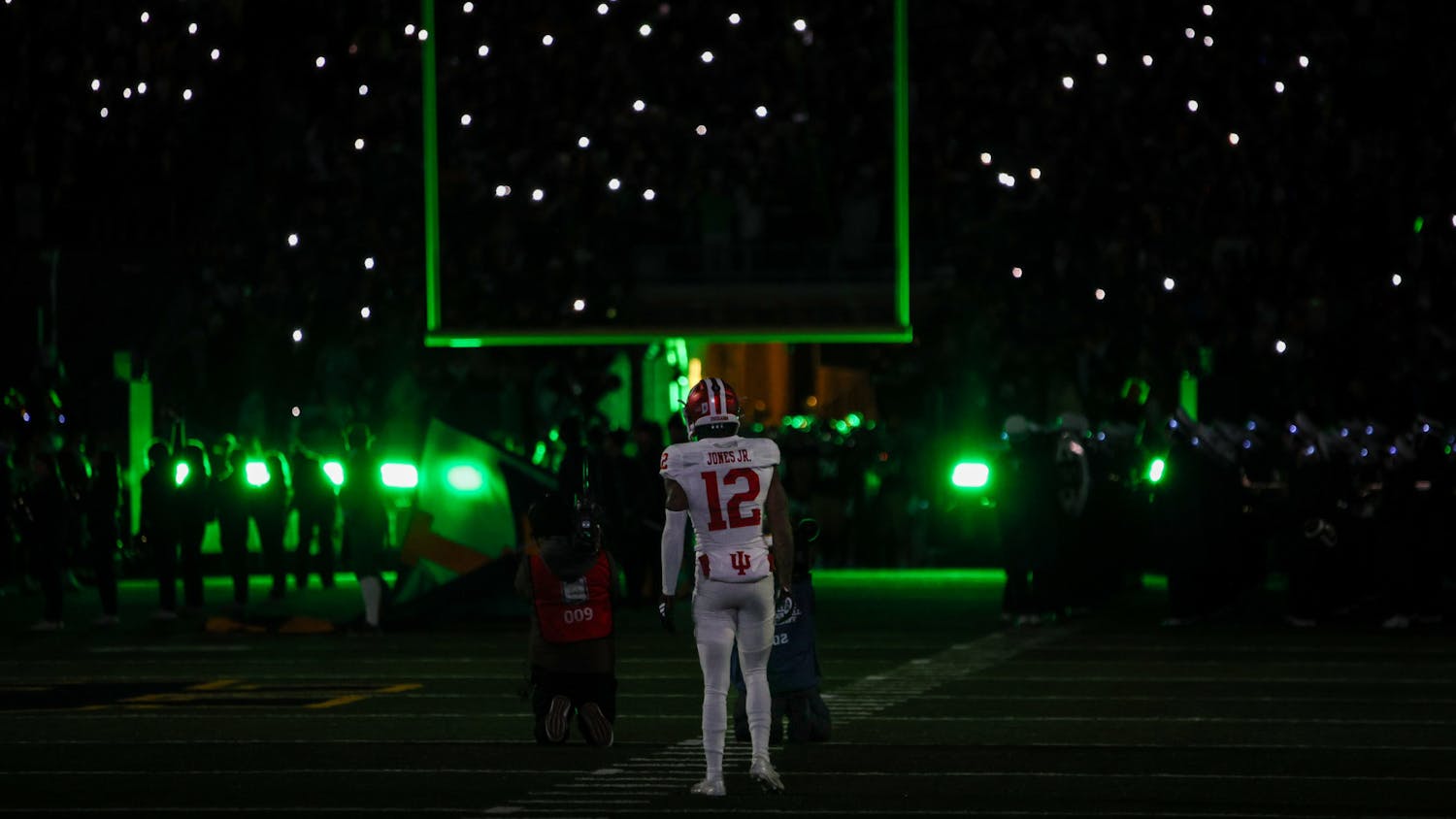Haydon Whitehead isn’t supposed to be noticed, at least for no more than the long black hair flowing out from under the back of his helmet. When he’s made his appearances at media sessions his round table is rarely full, right next to crowds surrounding the skill position players and quarterbacks.
Such is the life of a punter, a punter who this season had the fewest number of attempts in his three seasons at IU. A punter whose appearances became fleeting, looking on at an offense producing at a level Whitehead hadn’t seen during his time In Bloomington.
A punter who never thought he would be here.

Whitehead doesn’t quite remember standing back at his own 14-yard line under the Memorial Stadium lights for the first time. He doesn’t quite remember running out on the field in his red Indiana uniform with a red, trident logo helmet. He blacked out.
He looked across the line and saw silver helmets with a red stripe down the middle, white jerseys with red lettering and silver pants: then-No. 2 ranked Ohio State.
His punt was simple, executed well. He caught the snap and ran to his left before booting the ball. It sailed toward the IU sideline, bouncing out of bounds and the Ohio State 27-yard line.
“Just running on the field, you have to trust all the training we’ve done for at that point the last seven or eight months,” Whitehead said.
All the visual cues he’d learned in his training were there. He didn’t have to think much, especially with all the distractions surrounding him in the stadium.
The crowd at Memorial Stadium gave him a small cheer as he ran off the field. That Thursday night game was the opener of the 2017 college football season, and Memorial Stadium was filled to the upper-most corners in a way it hasn’t been since.
Whitehead had never punted in front of a crowd like that before. He hadn’t ever punted in a game at all before.
His goal never was to play college football.
***
Whitehead is from Melbourne, Australia, a city and area of the country where Australian rules football is the most popular sport. On Saturday mornings kids around 5 years old take part in introductory skills program. Whitehead started right around age 4-5.
He played other sports growing up, playing cricket all the way until he was a teenager. But it was too slow for him and didn’t have the contact he loved about football.
“I was pretty high strung as a kid, so I liked to be running around all the time,” Whitehead said. “I guess that’s one of the reasons I chose Aussie rules in the end.”
Aussie rules football isn’t played with pads, nor a gridiron. It has a rugby shaped ball and both scoring and passing center around kicking. Most make the jump to play professionally, in the Australian Football League, right after high school. The 2019 draft had five rounds, and only 65 players selected. If a player misses their chance to sign with a team at the end of high school, it becomes nearly impossible to make it at all.
The Australian Football League was what Whitehead had his sights set on from a young age.
But in the final months leading up to the draft, Whitehead realized he wasn’t going to make it. His choice of sport as a kid had always been easy. Suddenly it wasn’t. He had to give up the sport where he’d chased his dream.
In the moments players like Whitehead move on and exit their childhood game, Prokick Australia enters. Whitehead, like many others that have come before and after him, had one skill that could translate — kicking.
“It's a whole different approach because as it was explained to me when I was studying all this, the way we were raised throwing the football they're raised kicking it to each other,” IU head coach Tom Allen said in a February 2017 press conference announcing his first signing class.
Whitehead didn’t know anything about college football, so he went to YouTube to watch a game.
He found a game between LSU and Ole Miss. He saw the SEC crowds and passion surrounding a sport so far away to his Australian home. And he saw LSU’s punter, Brad Wing, a Melbourne native. Because of Wing, LSU became Whitehead’s favorite team to watch as he learned the college game.
Wing was part of the first wave of Australian punters in college football. Over the course of the decade it grew with a snowball effect. Players like Whitehead who never made it in the Australian Football League took up American football.
Now the rugby style punt, catching the snap and running toward and sideline before hitting a low bouncing punt is a common place and threaded throughout college football.
That all stems back to Prokick Australia, headed by Nathan Chapman.
Over the course of 10 years, Chapman has built a program that is consistently bringing dozens of players across from Australia to the United States.
“If you sell a good coffee, people talk about it,” Chapman said. “If you cook a nice meal, people talk about it a restaurant. If you’re getting results along with the quality coaches want more, players are interested.”
They build their class by inviting interested players for assessments. Once invited into the program, coaches begin a yearlong program to transition the players from the style of kicking they grew up with to the spiral kick they need in the American game.
“We can do the roll out kick, we can do that blindfolded, no worries," Chapman said. "But the spiral, we work damn hard at it and we’ve got a really good teaching method and coaching structure to get the best out of each player.”

Whitehead had no difficulties earning an invite. Chapman knew right from the assessment Whitehead was a player capable of reaching a high major program.
“It was refreshing, refreshing to see someone kick a ball so smooth," Chapman said. "When you see someone come in who's got a really nice, beautiful long leg kick, nice high follow through…If this kid joins, we know we’re going to change his life.”
While Chapman and his staff train Whitehead and others to prepare them for the jump to college football, they are simultaneously looking for a school to take their players. Glamorous signing day shows, commitment videos and swarms of media surround the decisions of high schoolers in America making their decision on where they will play in college.
Whitehead never had that. His decision, largely, was made for him.
“The player-to-coach contact is one of the last steps which the guys at Prokick do a really good job,” Whitehead said. “Just in case anything happens, falls through, they try not to get our hopes up until they’re pretty confident that the school we’re going to talk to is the one we’re going to end up at.”
Allen had only had an Australian punter once before, when he worked at Ole Miss. He began to build a relationship with Prokick then. He reached out to Prokick as he began to put together his first recruiting class as the Hoosiers head coach. They came back with Whitehead and the match was made.
It wasn’t until a month ahead of his official visit to Indiana that Whitehead spoke with the coaches in Bloomington for the first time. He never considered another school. He didn’t have that option.
Whitehead’s official visit to IU was his first time on American soil. He had only talked on the phone or Skype with IU’s coaches. Meeting them in person sealed the deal. The paperwork was signed quickly, and Whitehead was a Hoosier. His first time living away from home in Melbourne would be nearly 10,000 miles and a 16-hour time difference away.
***
That was Whitehead’s toughest adjustment. His family has made a trip over to Indiana in each of his first three years, the first trip coming for his first game. But Whitehead was a mid-year enrollee, and he spent the first months in America without seeing his family, learning to make that adjustment.
He, too, had to adjust to driving on the other side of the road and the weather. He hadn’t seen snow before coming to America.
“I realized portion size in America with food is so much bigger,” Whitehead said. “It took me six or seven months to be able to finish a plate at a restaurant.”
Kicker Logan Justus and his family made Whitehead feel welcome most, as did now-graduated long snapper Dan Godsil and his family. He’s learned the history of a program he knew nothing of when he arrived. He learned the significance of IU’s bowl eligibility clinching win over Nebraska and what it meant to win the Old Oaken Bucket this year, the first time he’s beaten Purdue.
He’s only been able to do just so much traveling around football season. He still wants to see New York City and Chicago before his time in America is over. He’s been to Florida twice, and one of those trips was for the 2018 season opener against FIU. It reminded him of the Gold Coast back home.
And just as he’s learned the significance of IU’s milestones throughout the 2019 season, he knows why his third trip to Florida is easily his most meaningful.
“Have a chance to win nine games in a season after the bowl game is something that would be pretty special for this program and something that I’m looking forward to contributing to,” Whitehead said.
He’s been put on Ray Guy Award watch lists in each of his three seasons with IU, and in 2019 he booted a career-best 65-yard punt. Whitehead was among the nation’s leaders in punts downed inside the 10-yard line.
As the season wound toward its end Whitehead was deemed eligible for one final year of eligibility. Academically, it is his sixth year, athletically his fourth.
One more year to expand on the leadership role he sees himself in, to build on the success the team has had in 2019 and complete a post-graduate degree in the School of Public and Environmental Affairs. And if an opportunity to play in the NFL came along — a chance to play football professionally as he had always wanted, albeit in a different country — he would pursue that too.
Whitehead isn’t the driving factor getting IU to the TaxSlayer Gator Bowl, as no punter would be. Even in a year where he’s been needed less, his role has been executed without flaws. He hasn’t been noticed, and that — unlike his journey to college football itself — was as intended.

Haydon Whitehead always wanted to play football. Just not American football.
More





